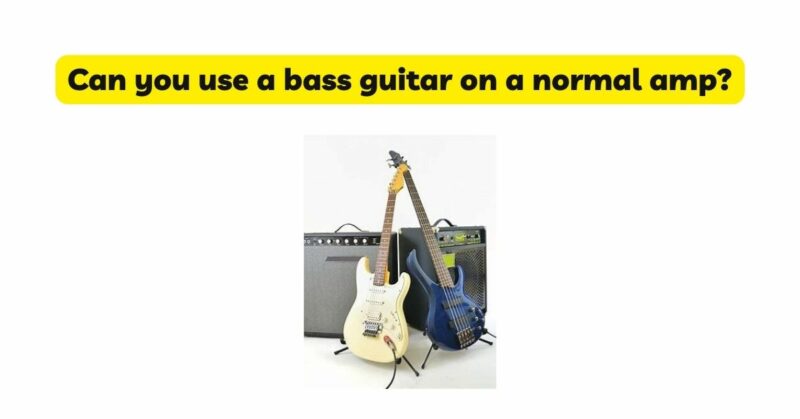The bass guitar is a fundamental component of any band or musical ensemble, providing the low-end foundation and rhythmic drive. While bass guitar amplifiers are specifically designed to handle the unique characteristics and frequencies of the instrument, many musicians wonder if it’s possible to use a bass guitar on a regular guitar amplifier. In this article, we will delve into the topic and explore the considerations, advantages, and potential challenges of using a bass guitar on a standard guitar amp.
Understanding Guitar Amplifiers: Standard guitar amplifiers, often referred to as guitar amps, are designed to amplify and shape the sound of electric guitars. They typically feature preamp and power amp sections, tone controls, and built-in speakers or the ability to connect external speaker cabinets. Guitar amps are optimized for the frequency range and tonal characteristics of guitars, emphasizing midrange frequencies and offering various tonal options through different amp models and onboard effects.
Considerations for Using a Bass Guitar on a Guitar Amp:
- Frequency Response: One of the main considerations when using a bass guitar on a guitar amp is the difference in frequency response. Bass guitars produce lower frequencies compared to standard electric guitars. Guitar amps are not typically optimized to handle the extended low-frequency range of a bass guitar, which may result in a lack of low-end definition, muddiness, or speaker distortion.
- Power Handling and Speaker Capability: Bass guitars require more power to accurately reproduce their lower frequencies. Guitar amps, especially smaller practice amps or low-wattage models, may not have sufficient power handling capabilities to handle the demands of a bass guitar. Additionally, guitar amp speakers are often designed to excel in midrange frequencies and may not be able to reproduce the low-end content of a bass guitar accurately.
- EQ Adjustments: Guitar amps are typically equipped with tone controls that are optimized for guitar frequencies, focusing on shaping midrange and treble tones. When using a bass guitar on a guitar amp, adjustments to the EQ settings may be necessary to compensate for the lack of low-end response. Reducing the bass control and boosting the midrange and treble controls can help achieve a more balanced tone, although it may not fully replicate the sound of a dedicated bass amp.
- Volume and Headroom: Bass guitars often require higher volume levels and greater headroom to reproduce their low-frequency content effectively. Guitar amps may not have the power reserves or headroom necessary to handle the increased demands of a bass guitar, resulting in distortion, clipping, or potential damage to the amplifier or speakers. Pushing a guitar amp beyond its limits for extended periods can also lead to premature wear and reduced lifespan.
Advantages and Limitations of Using a Bass Guitar on a Guitar Amp:
- Portability and Convenience: Using a bass guitar on a guitar amp can be advantageous in terms of portability and convenience. Guitar amps are often smaller and lighter than dedicated bass amps, making them easier to transport to rehearsals or gigs. This can be beneficial for bassists who frequently need to move their equipment or perform in different locations.
- Cost-Effectiveness: If you already have a guitar amp and occasionally need to play bass guitar, using your existing amp can be a cost-effective solution. It eliminates the need for purchasing an additional bass amp, saving you money and storage space.
- Tonal Experimentation: Using a bass guitar on a guitar amp can lead to interesting tonal possibilities and experimentation. The inherent tonal characteristics of the guitar amp, such as its specific EQ shaping and overdrive capabilities, can create unique and potentially desirable bass tones that differ from those produced by a dedicated bass amp.
Limitations and Potential Challenges:
- Lack of Low-End Definition: Guitar amps are not designed to handle the extended low-frequency range of a bass guitar. The lack of low-end definition and clarity can result in a less punchy and defined bass sound, affecting the overall mix and impact of the music.
- Potential Speaker Damage: Bass guitars produce more substantial low-frequency content, which can strain and potentially damage the speakers in a guitar amp not designed to handle those frequencies. Continuous use of a bass guitar on a guitar amp may lead to blown speakers or reduced speaker lifespan.
- Reduced Headroom and Power: Bass guitars require more power and headroom to accurately reproduce their low-end frequencies. Guitar amps may not have the power reserves or headroom necessary to handle the increased demands, resulting in distorted or clipped sound at higher volumes.
Conclusion: Using a bass guitar on a regular guitar amp is possible, but it comes with certain considerations and limitations. While it can provide convenience and cost-effectiveness, it’s important to recognize that guitar amps are not optimized for the extended low-frequency range of bass guitars. The lack of low-end definition, potential speaker damage, and reduced headroom should be taken into account. If you plan to play bass guitar regularly, investing in a dedicated bass amp is highly recommended to ensure optimal sound quality and to protect your equipment.

